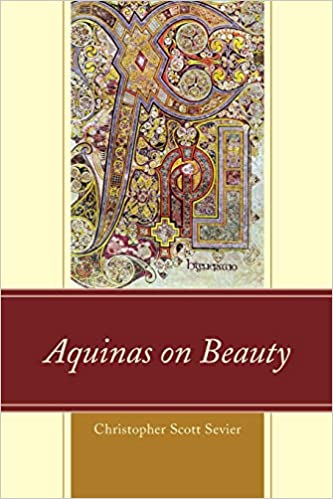“Aquinas’s account of beauty respects both the objective and the subjective aspects that are involved in the aesthetic experience, since both objects (e.g. things, actions, people, etc.) and subjects (perceivers of such things) are necessary for the human experience of beauty to occur. At the end of the day, Aquinas’s account of beauty is best thought as objectivist in nature. Beauty is to be found in (i.e. a feature of) things (including events). However, aesthetic experience or judgement requires perceivers, and Aquinas provides an account of the subjective experience of beauty in terms of the effects of beauty on human perceivers. In this study, I will be investigating both aspects of Aquinas’s account …” (p. 4)

Aquinas on Beauty
Christopher Scott Sevier
Paperback 242 pages
Lexington Books; Reprint edition (November 14, 2016)
ISBN-13: 978-1498512541
$46.97
In accord with the mission of this site, we seek to reconcile the subject-matters of the variety of academic disciplines with the nature of humans that seek to explore them. Such a human explorer sees good in his or her subject-matter and possess the talent and skill to pursue it by having in them the love of the subject to know it deeply and discover novelty that advances it further. This interplay between the knower and the subject-matter to be known can nicely be framed in terms of the interplay between the object of beauty and the subject that is drawn to it. Here Aquinas provides the understanding for this interplay, not from any treatise on beauty that he has written, but rather can be found engaged with throughout his various works, in particular his magnum opus the Summa Theologica. In his book, Aquinas on Beauty, Christopher Sevier provides a nice thorough account of both the subjective and objective perspectives of beauty according to Aquinas and how the two are inextricably linked. In particular, he begins by looking at Aquinas’s well-known formula “beautiful things are those which please when seen” and shows how it relates to form and therefore pertains to the intellect and in understanding things in terms of being in due proportion. This provides one avenue for how Aquinas accounts for the way beauty as objective is the source for the subjective experience of it. Sevier also provides an important account for how Aquinas understands the role of desire and pleasure in the subjective arrival of beauty and thereby shows how goodness and beauty are linked and yet differ in accordance with the difference of will and intellect in the human person. Overall, this book has as been an excellent resource for engaging with and articulating how beauty can be seen to be part of the human understanding and practice of one’s craft.
I enjoyed reading this review. The review makes me think that in pursuing Aquinas’ thoughts, I will become more aware of the role I, as a human being, play in experiencing the presence of beauty.